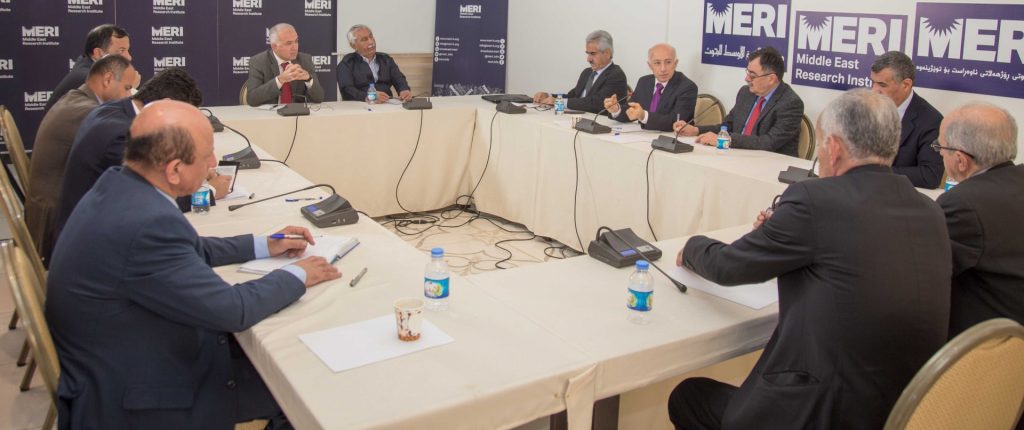On 23 February 2017 the Middle East Research Institute (MERI) hosted a roundtable aimed at gathering top leaders from political parties in Iranian Kurdistan to discuss recent changes in international politics and their implications for the region. The participants included:
- Mustafa Hijri and Mohammad Nazeef, the Democratic Party of Iranian Kurdistan
- Abdullah Mohtadi and Anwar Mohammadi, Komala Revolutionary Party of Iranian Kurdistan
- Mustafa Mouloudi and Aso Hassan Zadeh, the Kurdistan Democratic Party (Iran)
- Ibrahim Alizadeh and Rehman Najat, the Iranian Communist Party (Komala)
- Reza Kaabi, the Iranian Komala Party of Kurdistan
- Rebwar Hosseini, Organisation of Iranian Kurdistan Struggle

The discussions focused mainly on possible changes in US foreign policy in the wider Middle East as well as Kurdistan after the election of President Donald Trump and the formation of his new administration. Views were exchanged about changing the balance of the regional powers in the Middle East, particularly Iran, Turkey and Saudi Arabia and the increasing role of Russia in the region, especially in Syria. Other major changes in the Middle East, such as the war against the Islamic State (IS) in Iraq and Syria and the presidential election of the Republic of Iran, were also debated.
A variety of viewpoints were expressed with regard to the consequences of these drivers for change. The difficulty of forecasting the policy of the new administration at the present time was emphasised. Even within the US, the participants argued that the current administration is perceived to be in the making, and leadership positions in key institutions have not yet been filled, whilst there is a lack of clarity in many policy areas. The participants also discussed whether the Trump administration’s version of US interest will accord with the conflicting interests of the various US allies in the Middle East. Therefore they argued that local actors should take time to assess US policy and avoid becoming part of any conflict. They stressed that the Kurdish political parties should strive to remain impartial, become a force for peace and stability in the region and not become part of the existing rivalries among the regional and global powers.
* * * * *
About MERI: The Middle East Research Institute is Iraq’s leading policy-research institute and think tank. It is an independent, entirely grant-funded not-for-profit organisation, based in Erbil, Kurdistan Region. Its mission is to contribute to the process of nation-building, state-building and democratisation via engagement, research, analysis and policy debates.
MERI’s main objectives include promoting and developing human rights, good governance, the rule of law and social and economic prosperity. MERI conduct high impact, high quality research (including purpose-based field work) and has published extensively in areas of: human rights, government reform, international politics, national security, ISIS, refugees, IDPs, minority rights (Christians, Yezidis, Turkmen, Shabaks, Sabi mandeans), Baghdad-Erbil relations, Hashd Al-Shabi, Peshmarga, violence against women, civil society. MERI engages policy- and decision-makers, the civil society and general public via publication, focused group discussions and conferences (MERI Forum).

